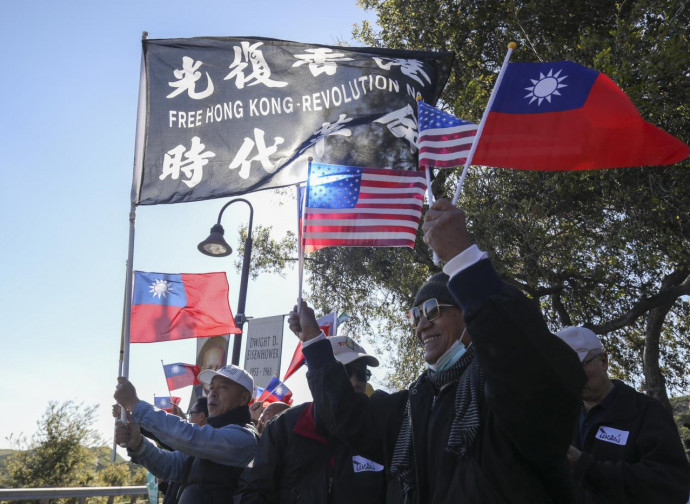Warmongering China makes Taiwanese want independence
The latest polls reveal the Taiwanese no longer feel Chinese and disagree with the 1992 Consensus agreement which establishes the principle of one country (albeit two systems). China would never accept a proclamation of independence. Storm clouds are gathering as 2024 gets closer, the year of the elections.

With the termination of the recent ominous Chinese military exercises, theTaiwanese are feeling more distant from mainland China. This is the conclusion of a survey carried out by the Taiwanese Public Opinion Foundation as reported by the Asia News agency. In fact, with the upcoming presidential elections in 2024, this anti-Beijing sentiment is translating into an ever-growing consensus for the Democratic Progressive Party (PDP) currently chaired by President Tsai Ing-wen.
The current situation poses two interesting considerations: the first is whether those interviewed agree with the former nationalist president Ma Ying-jeou who, on his trip to China, standing in front of the mausoleum dedicated to the father of the Republic Sun Yat-sen, pronounced the phrase, “we are all Chinese”. Interestingly, only 16% of Taiwanese agree, at least in part. And just 7% say they feel Chinese. 42% disagree with Ma and 25% disagree “in some way”. The second interesting question concerns the 1992 Consensus, which defines the principles of relations between Beijing and Taipei. Currently only 22.5% agree, while 67% are now against.
The agreement reached between the then nationalist government (the Kuomintang party) and the Chinese communist regime on what the two sides mean they say "China", in reality amounts to a legitimatised disagreement. For the Kuomintang, the nationalist government is the only legitimate one, for Beijing it’s the communist regime. The apparently absurd agreement serves to reaffirm, at least formally, the principle of One China, of national unity. On paper, both the People's Republic and Taiwan are the same country, even if each maintains its own political and economic system: capitalist and democratic Taiwan, the People's Republic communist. But, if 67% of Taiwanese say they are against it, evidently the present majority considers themselves an independent nation.
Moreover, in a previous survey by the Taiwanese Public Opinion Foundation, 78% of Taiwanese people believe they are not Chinese. Only 9.1% say they are both Chinese and Taiwanese. And even fewer, 7.7% claim to be Chinese. Judging by the trend, until 1995 (the year of the first major Taiwan Strait Crisis), the majority felt both Chinese and Taiwanese. Thereafter, there is a sharp prevalence of those who consider themselves only Taiwanese. The moment of maximum independent national sentiment was reached in 2020, in conjunction with Covid. And it’s not difficult to understand why: the government of Taiwan was the first to raise the alarm about what was happening in Wuhan. Beijing effectively forced the WHO not to listen. During the pandemic, the island was among those that managed the crisis best, recording the least mortality and impact on the economy. But, again by order from Beijing, it was excluded from all international forums and literally left to fend for itself.
Yet, while expressing an increasingly marked national identity, it’s clear the vast majority (76.6%) is in favour of a relaxation of the tensions in the Strait. Realistically, 58.6% think that the United States supports the island for its own interests, even when these do not coincide with those of Taipei. But in any case, 61% agree with the United States' policy of containing China, even if pursued in the name of Washington's interests.
It's hard to tell how much these views will translate into support for the next PDP presidential candidate. Indeed, last November, the left was clearly defeated in the administrative elections and Tsai Ing-wen, for this reason, will not run again in 2024. But the consensus for the party, if led by vice president Lai Cing-te, is increasing. Currently, Lai beats Hou Yu-ih (possible Kuomintang candidate) 36% to 25%. While the results of the elections will be of extreme importance, for everyone, not only East Asia.
Moreover, by the triumphant welcome afforded to ex-President Ma and condemnation of Tsai's trip to America, China has already, de facto, muscled in on the electoral campaign. It’s clear China would prefer the Kuomintang, which, from Beijing's point of view, would better guarantee the status quo. Tsai, on the other hand, is judged by the communists as a dangerous pro-independence activist. Paradoxically, Beijing wants an old nationalist enemy to command the "rebel" island, considering the new left to be more dangerous. Xi Jinping has warned numerous times in recent years that a formal declaration of independence would lead to war. The last time, just last week, was when he declared that Taiwanese independence and peace in the Straits are "mutually exclusive".
But the One China principle, as these polls also show, no longer makes sense and is anachronistic. Taiwan has witnessed how the Beijing regime behaved, not only during Covid, but also, the year before, when Hong Kong was absorbed, without respecting the agreements signed with the United Kingdom, which provided for full autonomy until 2047. Accepting de facto, as well as formal unification, would mean the end of all freedom for Taiwan. The Chinese who live there know this well by now. So what will happen in 2024? Among other things, it’s the same year of the US presidential elections and with the polarisation between Trump's and Biden's sides, China will try to exploit any electoral unrest, like that in 2020. But, without US support, Taiwan has no hope of survival. So the game is still to be played and the result is an incognito.
